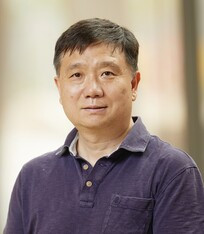
Professor ZHANG, Bing
Professor, Chair of Astrophysics, Global STEM Scholar, Department of Physics, Faculty of Science, HKU
B. Sc: Peking; PhD: Peking
- [javascript protected email address]
- 3917 5932
- 2559 9152
- Room 523, CYM Physics Building, The University of Hong Kong, Pokfulam Road, Hong Kong
Current Research
Gamma-ray bursts
Fast radio bursts
Electromagnetic counterparts of gravitational waves
Multi-messenger astrophysics
FAST (Five-hundred-meter Aperture Spherical Telescope): FRB Key Science Project (PI: 2000-2025)
Einstein Probe: Chair of multi-messenger Science Topical Panel, member of scientific management committee (2023-)
SVOM (Space-based multi-band astronomical Variable Object Monitor) Chinese-French GRB mission: Mission Scientist (2009-)
Research Interest
Theoretical astrophysics
High-energy astrophysics
Multi-messenger astrophysics
Black holes, neutron stars, astrophysical transients
Representative Publications
Bing Zhang, “The physics of gamma-ray bursts”, 2018, Cambridge University Press, DOI: 10.1017/9781107027619 (a 578-page textbook/monograph)
Bing Zhang, “The physics of fast radio bursts”, 2023, Reviews of Modern Physics, 95 (3), 035005
Bing Zhang, “The physical mechanisms of fast radio bursts”, 2020, Nature, 587, 45-53
Pawan Kumar & Bing Zhang, “The physics of gamma-ray bursts & relativistic jets”, 2015, Physics Reports, 561, 1-109
Bing Zhang & Pawan Kumar, “Model-dependent high-energy neutrino flux from gamma-ray bursts”, 2013, Physical Review Letters, 110(12), 121101
Bing Zhang & Huirong Yan, “The internal-collision-induced magnetic reconnection and turbulence (ICMART) model of gamma-ray bursts”, 2011, The Astrophysical Journal, 726(2), 90
Bing Zhang, Yi-Zhong Fan, Jaroslaw Dyks, Shiho Kobayashi, Peter Meszaros, David N. Burrows, John A. Nousek & Neil Gehrels, “Physical processes shaping GRB X-ray afterglow lightcurves: theoretical implications from the Swift XRT observations”, 2006, The Astrophysical Journal, 642, 354
Awards and Honours
2024 | | | Nevada Regents' Researcher Awards, Distinguished Career |
|---|---|---|
2024 | | | Highly ranked scholar in Astronomy during Lifetime according to ScholarGPS |
| 2022-2024 | | | Highly ranked scholar in Astronomy during the prior 5 years according to ScholarGPS |
| 2020 | | | Finalist for the Association of American Publisher's PROSE (Professional and Scholarly Excellence) Award in the Cosmology and Astronomy category |
| 2020 | | | Main corresponding author of a paper selected as one of the "Top Ten Breakthrough of the Year" in 2020 by the Science magazine and one of the "Ten Remarkable Discoveries from 2020" by the Nature magazine |
| 2020 | | | Distinguished Professor Award, the University of Nevada, Las Vegas |
| 2014 | | | Elected fellow, American Physical Society |
| 2012 | | | Barrick Distinguished Scholar Award, the University of Nevada, Las Vegas |
| 2009 | | | Thomson Reuters Science Watch analysis: highly cited scholar in the past 10 years and in the past 2 years in the field of gamma-ray bursts |
| 2007 | | | First author of the "New Hot Paper" in the field of Space Science identified by Essential Science Indicators in July 2007 |
| 2007 | | | Bruno Rossi Prize, High Energy Astrophysics Division of the American Astronomical Society, as a Swift team member |
| 2005 | | | One of the main authors of a paper selected as one of the "Top Ten Breakthrough of the Year" in 2005 by the Science Magazine |


